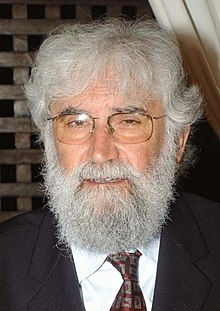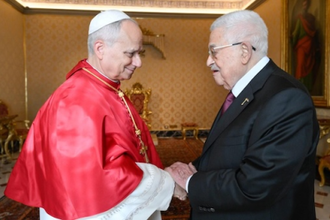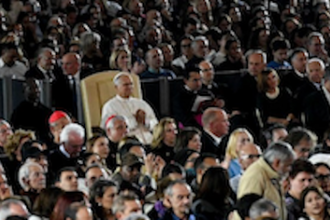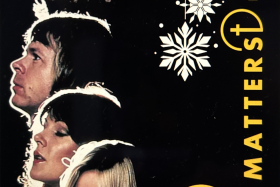Leonardo Boff: Pope Francis is not afraid of the truth

Leonardo Boff
Text of talk delivered by Leonardo Boff at a conference in Buenos Aires, Argentina, April, 2017.
Pope Francis is not afraid of the truth
We are presently suffering an enormous vacuum of leadership, both in the Church and in society. But there is one who stands out from this mediocrity. That is Pope Francis, precisely because he is not afraid to speak the truth.
A Pope who speaks the truth in the Church
The institutional Church, as all power holders, normally does a tightrope-walker's discourse, pretending to be above all conflict and tension. The result is anodyne statements, lacking prophetic power, which, in the end, do not move society. Francis, who prefers to call himself Bishop of Rome rather than Pope, does not come from the crepuscular European Christianity (with only 25% Catholics), but from the new Churches, no longer colonial, but with their own indigenous roots. The great majority of Catholics (more than 62%) live in those Churches, to the point that it now can be said that Catholicism is a religion of the peripheral world.
One of the most notable characteristics of this Pope is that he is not afraid to speak the truth. He denounces the pedophiles in the Church, the financial scandals of the Vatican Bank (IOR) and the Church as a fortress, closed within herself and apart from contemporary society. He wants a Church that is open to everyone, better yet, he wants a Church like a field hospital, that welcomes everyone with no questions. Pope Francis levies harsh criticisms on the Bishops and priests who do not proclaim the beauty of the Gospels and the joy of the good news. Francis says that they seem to have a sour face, that they are people of Good Friday, who are as sad as if they were going to their own funerals.
My book, The Church: Charisma and Power, was condemned in 1984 by then Cardinal Joseph Ratzinger, who became Pope Benedict XVI, because, according to him, in that book I criticised, as the Protestants did, how power, that carries arrogance and exclusion, predominates over Charisma in the Church. Listening to Pope Francis' words and comparing them to what I wrote, my criticisms now sound like a pious text.
But, to me, what he said about hell to the faces of the new Cardinals was his most courageous. It is what great many theologians have thought but never could say without risking immediate censure. The Pope says, addressing the fear of hell the Church has used to torment the faithful: God does not know eternal damnation. His mercy is infinite and goes beyond justice. There surely will be a judgment because not everything is right with this world. But the world is not the last act of God, Father and Mother of infinite goodness and mercy. God always brings home everything He created with love, because they were born from the Father's heart. When the time is right, they will return to what was prepared for them from the beginning of time: the communion in the Kingdom of the Trinity. They certainly would have passed through God's purifying clinic, but that is the threshold of heaven, and not hell.
This is how we understand the transposition in the terminology of his announcement: Pope Francis speaks of the revolution of tenderness, of the joyfulness of conjugal love, of the beauty of the gospels that fascinates people.
More important than the Church is the creation that is threatened with destruction -- the reason for his Encyclical letter about ecology that is addressed to all of humanity -- and the commitment to safeguard the conditions that allow for life on Earth. Pope Francis strengthens a new type of ecumenism, putting aside the claim of exclusivity the Roman Catholic Church had that it was the only Church of Christ. It is important that the Churches mutually recognise each other and that together they be at the service of the world, especially of the most vulnerable.
Pope Francis has a clear option for the poor and suffering of this world. He seeks reconciliation with the Theology of Liberation, meeting with the father of this theology, Gustavo Gutierrez, and later on, with Jon Sobrino. As Pope Francis was writing his extraordinary Encyclical letter "on caring for our Common Home", he was not afraid of asking for suggestions from the writer of these lines. According to well known ecologists, such as Edgar Morin and others, that Encyclical letter puts Pope Francis at the vanguard of the ecological world debate.
In a word, Francis, Bishop of Rome and Pope of the Catholic Church, has brought Spring to the Church, with the enchantment this season represents, after a rigorous winter under the severe doctrines and disciplines of previous Popes. Francis put aside all the titles of power, abandoned the pontifical palace to live in a guests-house and to serve himself as any other, because, as he humorously comments, "this way makes poisoning more difficult."
The structural core of his preaching is the Tradition of Jesus. It is a theological concept recently used to identify the original intent of Jesus of Nazareth, prior to the elaboration of the four gospels. Jesus did not intend to found a new religion, but to teach us to live the goodness of his great utopia, the Kingdom of God, accomplished by total openness to God, unconditional love, unlimited mercy and the centrality of the poor and the invisible.
The message of Jesus is summarised in the Our Father, which affirms God as our Father and no just mine, signifying our upwards dimension; and Our Bread, not my bread, representing the human being taking root in the concrete life. Amen can only be pronounced by those who have united these two poles: the Our Father in heaven and our bread on Earth; Father of all and bread for all.
Because of the Tradition of Jesus, Pope Francis emphasises that love must come before dogma and doctrine, and the poor before discipline. The obsession with abortion must be overcome by the use of contraceptives and the communion of couples in renewed nuptials. The gospel must not be reduced only to these question, because if this happens, the gospel looses its fragrance and its beauty. Pope Francis forcefully said: "it is better to be a non-believer than to be a hypocritical believer". And to the lay and the young, Francis said: "A Christian who is not a revolutionary is not a Christian; we must be the revolutionaries of grace". Francis once again challenged them this way: "Do not be more papist than the Pope, do not be more restrictive than the Catholic Church".
Pope Benedict XVI wanted a pure Church. Francis prefers a Church that is troubled because she walks in the world, Francis wants the Church to be inclusive, with open doors, and without an office of prosecutors of the faith. The Pope wants a Church always seeking an encounter with the other, a Church for the world... A Church for the poor.
In sum, Pope Francis is not Euro-centric but open to universality. He is not eclesio-centric, because the Church is not an auto-referent, he is not Vatican-centric, because he prefers to guide the Church in a collegiate manner with love, not in a monarchical form with canon laws. Pope Francis lives in a boarding house, not in the Pontifical Palace; he is not pope-centric because he puts the People of God above all and feels like one of its members, clearly with a mission for all the Church. Being the Pope does not keep him from carrying his own briefcase, going to buy his own ticket from Alitalia to fly to the Island of Lampedusa, and to use his own cell phone to call someone who wrote him a letter. And he does not forget his friends, such as the shoemaker and the laborer from Buenos Aires, calling them on the phone once in a while, as he does with his old friends.
Faced with so many Christians who had abandoned the institution, such a Pope returns confidence, morality and respectability to the Church. With Pope Francis the Church regains relevance vis a vis the secular world.
The Pope who speaks the truth in Politics
The first that must be acknowledged with respect to the public and political dimensions of Pope Francis is his own person: charismatic, unaffected, in solidarity with the pain of the world and a friend of the poor. Francis is more than a name. Is a new way to exercise power, as real service and not as a privilege and an instrument of control.
This becomes clear in his total rejection of the titles and privileges that historically were added to the figure of the Popes. In the first pages of the Pontifical Yearbook are often found all the honorific titles that belonged to the Popes. Pope Francis renounced all of that, and simply put his name Fransiscus, with no qualifications.
Heads of State have a powerful security apparatus. Pope Francis foregoes that and travels to even the most dangerous places, such as Egypt and South Sudan. with no protection.
Francis argues: "I did not want to be Pope. It was God who wanted it; so God must defend me. If I am killed, it will be a sign that God has called me and then I will go joyfully to meet Him". Who can talk in such a free and liberating, I would say, mystical, form, of life and death? Only one who feels himself in the palm of the hand of God. So he has nothing to fear.
Moreover, few Popes were truthful regarding the ills of our culture that directly affect the most vulnerable. Francis is a Pope who has taken sides: he is with the least and the invisible, and against those who disgrace humanity and Mother Earth.
He strongly attacks the system of accumulation an idolatry of money. Francis does not use the word Capitalism, so as not to create difficulties for millions of Catholics who live within this system. But he describes the system in such a way that we are inevitably led to identify the capitalist system and its culture of unlimited consumption, individualism, and lack of solidarity, as the cause of misery and of the profound wounds to the body of Mother Earth.
His speech in the Island of Lampedusa where refugees from Africa arrive and many drown in the journey was very harsh. Francis said: "This culture of the well-off leads to indifference regarding the others; it is the globalization of indifference... We are the society that forgot the experience of crying, of being compassionate; the globalization of indifference has robbed us of the ability to cry".
A society that no longer cries with the one who is crying has lost its sense of humanity and is effectively on a path of self-destruction and barbarism.
Curiously, returning from his visit to Poland, Pope Francis spoke sharply when journalists in the plane mentioned the issue of terrorism as being of Moslem roots. Courageously, Francis said that which analysts do not want to hear. Religions, including Islam, do not want war, but peace. The refugees are in Europe now, because for centuries we had been in their countries, stealing their wealth and imposing our ways on the organisation of their societies. True terrorism is the economic-financial system that is against life. "We must say no to an economy of exclusion and social inequality, that type of economy kills".
As can be seen, he speaks directly, without obscuring metaphors, like the tightrope-walker type of speeches of previous Pontiffs, who put more emphasis on security and distance than on truth and clarity in their own Papal position. Francis' position is very clear: he talks and acts evangelically, from the perspective of the poor and wretched of this world and especially for the poor. "About this", he emphasises, "there should be neither doubts nor explanations that debilitate such an option, because an indissoluble link exists between our faith and the poor".
In his Encyclical letter about How to Care for the Common Home he repeats 35 times the need to change our relationship with nature; to change and change if we want to subsist. It is important to feel not that we are outside of nature, as if we were her owners, but that we are part of her and responsible for her sustainability. We must change our form of production, our mode of consumption and distribute well the natural goods and services. In this search for alternatives, Francis will not rely on the Social Doctrine of the Church, even though he respects it. But he notes: "We cannot avoid being concrete so that the great social principles do not remain mere generalities that do not move anyone". For Francis, we cannot wait for anything to come from above, the logic of which is always more of the same: that of ever increasing income, with no other consideration.
Francis believes in those who are outside of the system and are totally forgotten, because they produce little and consume less. Pope Francis trusts in those on the bottom. Therefore, he has met four times with popular social movements all over the world, three times in Rome and once in Santa Cruz de la Sierra, Bolivia. In that meeting he was unquestionably clear: we must demand the three "Ts": Tierra, techo y trabajo; (Land, Home, and Work). No one without land for survival, no one without a home or anywhere to live, no one without work to earn life's essentials.
That is one part. The other was a challenge to popular social movements to be protagonists of the new, new solidarian forms of production, agro-ecological cooperatives, forms of consumption characterized by shared sobriety and by a special care for Mother Earth, who offers us everything and is the basis of all we can project in this life. Pope Francis emphasized three points: that the economy not be at the service of the market, but at the service of life; that of building social justice, the basis of peace, and of caring for the Earth, our Common Home.
His travels have been noteworthy for his invitations to dialogue between peoples and religions. Francis proposes a culture of peace in the face of the more than 40 conflicts that exist now around the world that cost so many people their lives, and destroy so much cultural heritage. He has often noted that the level of conflicts and tensions in the world puts us in danger of a Third World War, whose consequences are unimaginable for the human species and the future of life.
He sounds like a prophet who proclaims in the desert, with extreme gravity and simultaneously, with a sense of hope that we can avoid the tragedy because we have technology, human genius, and above all, because we believe in a God who is "the sovereign lover of life " (Sabiduria 11,26).
Perhaps his most important political contribution was his 2015 Encyclical letter Laudato Si: About caring for the Common Home. It was addressed not only to Catholics, but to all of humanity. Pope Francis is aware of the threats to life and the Earth systems. And he makes a general call to care for our Common Home.
Francis uses the best scientific data, and from there, he develops a rigorous critique of the causes of the present situation: principally anthropocentrism, because of which humans believe they are the lord and master of nature and can use it at their pleasure. Humanity has developed a culture, now globalised, of total exploiting all natural goods and services for individual accumulation, without considering the destruction of entire ecosystems. This voracity has produced a double injustice: a social injustice, creating immeasurable poverty in a large part of humanity, and an ecological injustice, with the slow erosion of the physical and chemical basis that sustains life.
It is not about a green ecology, as many have called it. The vision of Francis is wider. It is about an integral ecology that includes the environment, society, the human mind (its projects, values and prejudices), politics, and, finally, its spirituality. The document incorporates cordial and sensible reason, that enable us to feel the suffering of nature as our own, that hears both the cry of the poor and the screams of the Earth. If we want to save the Earth we must nourish "a passion for caring for the world... a mysticism that moves us, encourages us, motivates us, and gives us courage" to love Mother Earth and to respect her inhereht limits.
In spite of the grave calls he makes to all, the Pope also elicits hope, be it in the capacity of humans to awaken to their responsibilities, or by using science, done with consciousness, to save life, and finally, by trusting in the Spirit, that according to Judeo-Christian Scriptures is the "Spirit of Life" and "sovereign lover of life". In the end, he expresses confidence, writing, "Let us walk singing, that our struggles and our concerns for this planet do not take from us the joys of hope" (n.244).
In effect, he has given political content to hope and tenderness. "Tenderness is not weakness but courage; it is the path of solidarity and humility". Hope is the capacity to say, "We". And if together we say "we... there starts a revolution"... The revolution of the future starts from the moment when people see themselves as part of a "we". That is where the social revolution lies, when the "we" opposes the "I alone" and all the other "I's", the typical attitude of the current capitalist system.
Bruno Giussani, the European director of TED (Technology, Entertainment, Design), a media organization that puts on conferences and exchanges at the world level, put it well: "Francis has become the only moral voice capable of reaching people beyond our borders, to create clarity and propose a convincing message of hope".
In a world filled with words of hate and prejudice among religions and cultures, the words of Pope Francis ring like a bell of peace, with an authority that radiates from his kindness, from his profound humanism and from hope against all hope; valuing the beauty, the joy of life and an intimate caring for Mother Earth.
Leonardo Boff writes: "This is the text of a conference delivered in Buenos Aires, Argentina, in April, 2017. We published it now, in 2018, with greater hope, peace, and resilience to overcome the social problems that so greatly affect all human beings, especially the most vulnerable."
01-11-2018


















